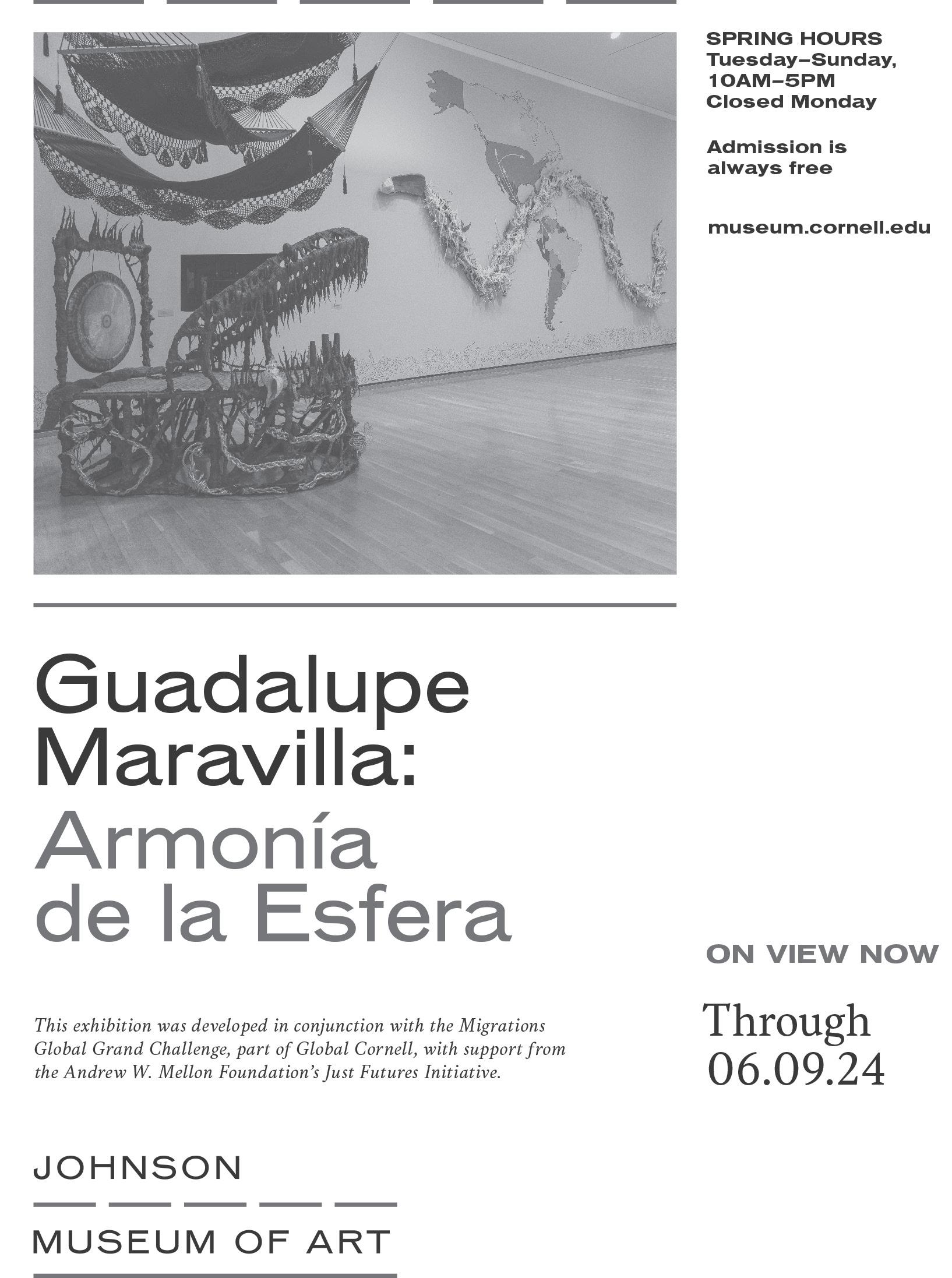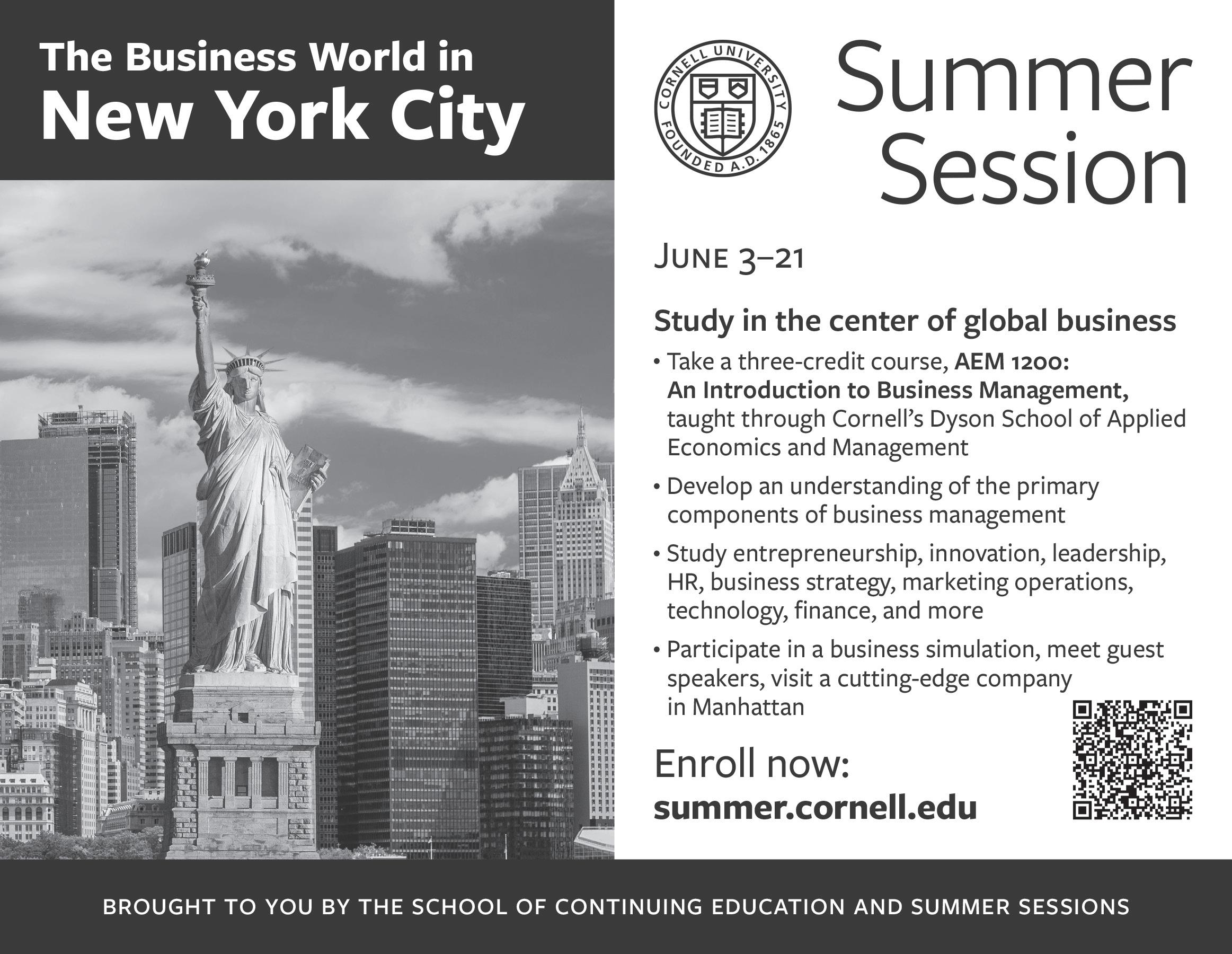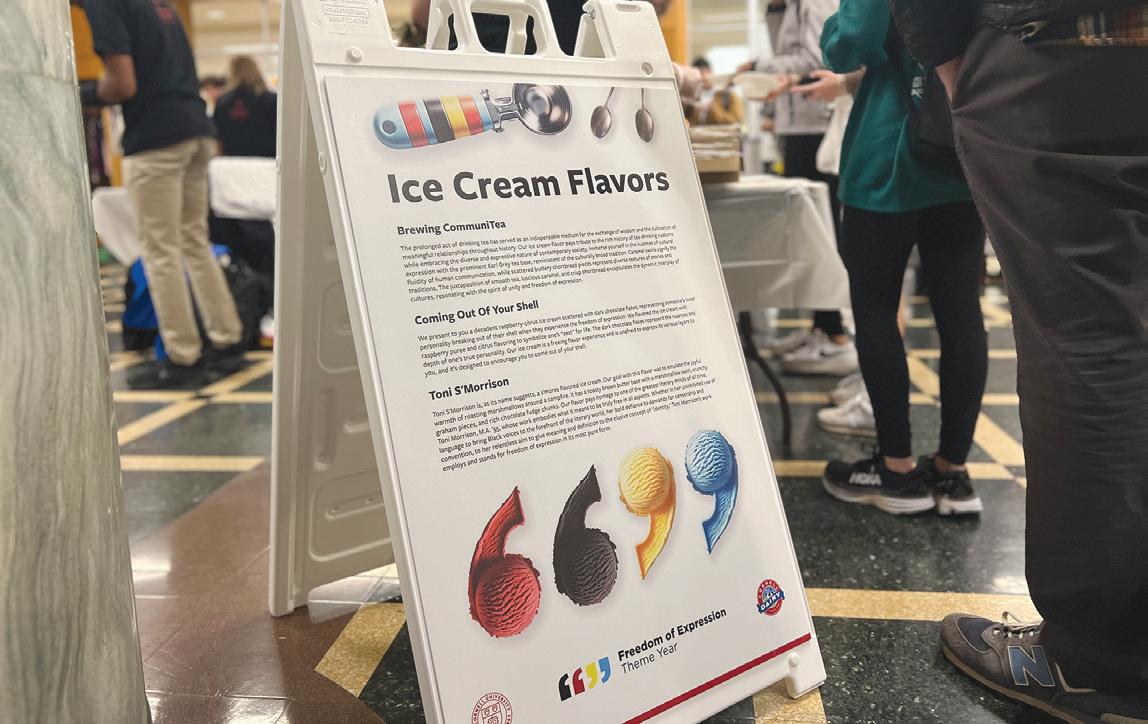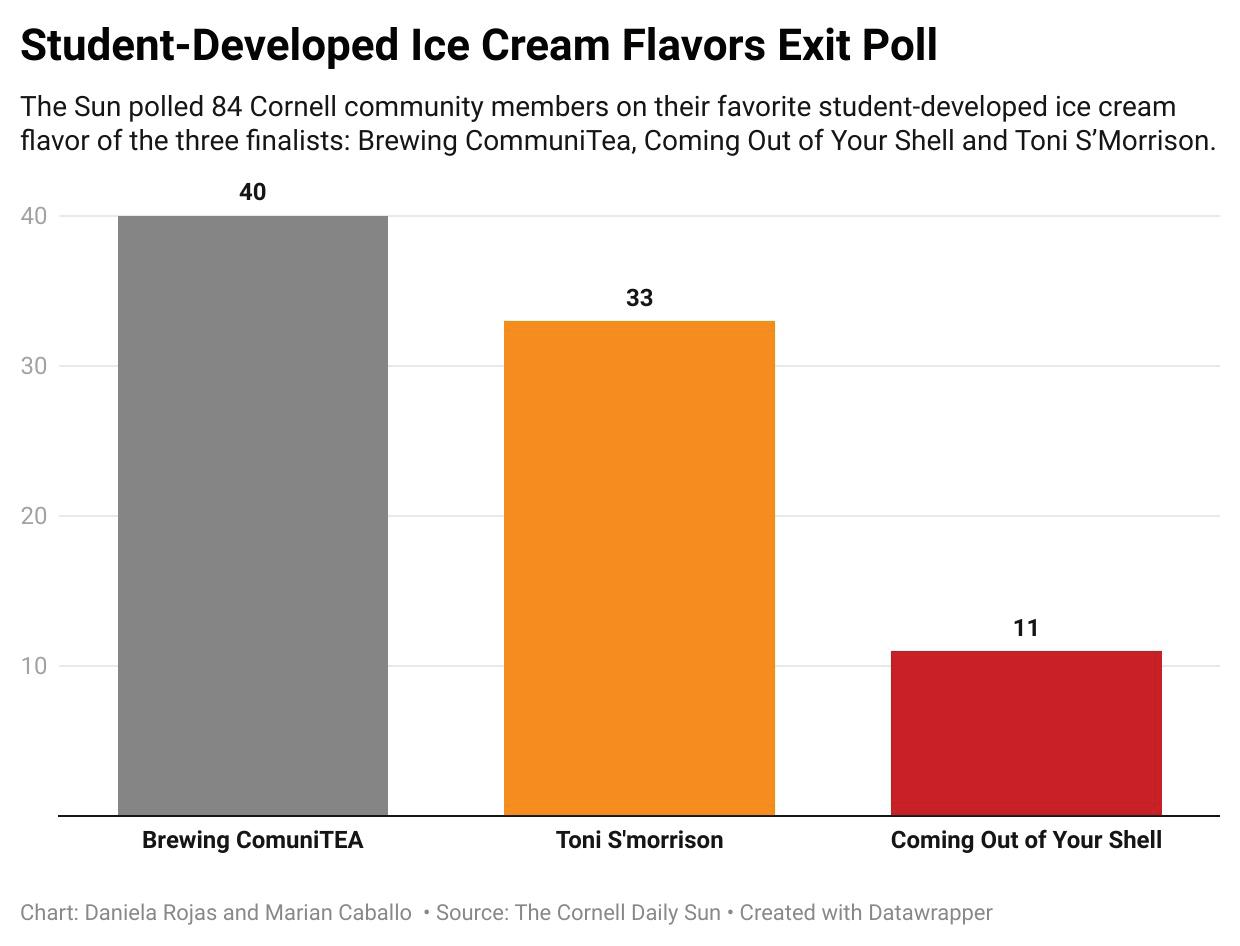The Cornell Daily



 By IONA GUNN Sun Staff Writer
By IONA GUNN Sun Staff Writer
Throughout Cornell’s Freedom of Expression theme year, students have felt that now more than ever, Cornell is an institution that embraces expression, protest and dissent.
“This is the best year for students and faculty to express themselves in Cornell’s history, especially with recent policies,” said Martin Pollock ’26. “Regulating loudspeakers, for example, really allows our actions to speak louder than our words because otherwise we’ll be arrested.”
In the wake of this resounding success, University administrators have decided on next year’s theme — the right to bear arms.
President Martha Pollack and Provost Michael Kotlikoff formulated the idea on a February getaway to Cancun, Mexico with U.S. Congressman Jason Smith (R-MO) and U.S. Senator Ted Cruz (R-TX). While reflecting on the success of the Freedom of Expression theme year on a white sand beach overlooking the Caribbean Sea, Smith encouraged the University administrators to continue looking to the U.S. Constitution for inspiration.
“Cornell’s celebration of the First Amendment has greatly improved the campus climate,” Smith said. “Why not move on to the second?”
Smith asked Pollack and Kotlikoff to consider establishing a “Right to Bear Arms” theme year for the 2024-2025 academic year.
“We’ve found that Cornell, more than many universities, does a poor job of affirming students’ Second Amendment rights,” Smith said. “You need to show students that their Second Amendment rights are an indispensable part of their academic experience.”
Cruz agreed with this assessment, explaining how Texas public universities allow students to carry concealed firearms on campus.
Under Texas Senate Bill 11 — passed in June 2015 — individuals with gun licenses are allowed to “carry a concealed handgun on or about the license holder's person” while on a Texas public university campus. New York State, by contrast, considers possession of a firearm on university grounds a class E felony.
“You soft New York liberals are always talking about putting trigger warnings in class,” Cruz said. “In Texas, we aren’t afraid to pull the trigger without warning.”
In spite of these legal differences across state lines, Smith encouraged the administrators to think about ways that firearms could contribute to the educational experience — including through enacting concealed-carry policies similar to those in Texas schools.
When asked by The Sun how the University would handle instances in which the upcoming theme year proposals would run counter to New York State laws, Pollack explained why this is not a concern to University administration.
“I’m not afraid of Kathy Hochul or anyone in the New York State government,” Pollack explained. “As long as congressional Republicans are happy with what’s happening here at Cornell, I can sleep at night.”
Later, during a catamaran cruise, Cruz offered additional ideas for celebrating the Second Amendment on campus.
“All students learn from humanities classes these days is Cultural Marxism and Critical Race Theory,” Cruz said. “Y’all don’t need the Arts Quad. Demolish it and put up a firearm superstore that accepts Big Red Bucks for students to learn to exercise their
right to bear arms instead.”
Kotlikoff responded immediately by saying, “‘Oh, that’s a great idea.’”
Pollack, worried that Smith would write another letter and get her hauled in front of Congress, similarly concurred.
“If this keeps me out of congressional hearings, we should do it,” Pollack said. “If Elise Stefanik (R-NY) makes me explain to her what constitutes a call for genocide, I’ll have to resign.”
Kotlikoff told The Sun that the University planned to incorporate aspects of Cruz and Smith’s visions for the upcoming theme year.
“I think diversity of thought is very important,” Kotlikoff said. “Incorporating both of these distinct and diverse perspectives on our next theme year will ultimately improve the quality of the education that Cornell offers.”
By EATON PUGH Sun Staff WriterTo cap off Cornell’s Freedom of Expression theme year, The Cornell Convocation Committee has confirmed that conservative personality Ann Coulter ’84 has been chosen as this year’s convocation speaker. “She was the obvious choice,” said Jon Lindseth VI ’24, President of one of Cornell’s conservative organizations (he didn’t know which one, we asked). “I mean, it was actually
“Students clearly couldn't get enough of her, which is why we've invited her back a third time.”
Jon Lindseth VI ’24









the administration who brought it up to us, but they don’t want to take credit, so I guess we will.”
After the success of Coulter’s campus appearance in 2022, Coulter reappeared on campus this week. “Students clearly couldn’t get enough of her,” Lindseth said. “Which is why we’ve invited her back a third time.”
“Pretty pweaseee.”
When asked about Coulter’s history of bigoted remarks, Pennis Drager ’20, a so-called free thinker, said, “Free speech means giving a platform to everyone. If we pick and choose, we jeopardize free speech for all.”









According to Lindseth, President Martha Pollack and Provost Michael Kotlikoff begged Coulter to return to campus, reportedly calling her directly and pleading, “Pretty pweaseee.”
According to Drager, Coulter’s convocation address will some how manage to stereotype every minority group.
It is Coulter’s hope that her unique perspec tives will encourage Cornell graduates to think critically

about the world in which they live, according to Drager.


















Staring Directly Into Te Sun Since 1880
Who the 142nd Editorial Board Would Write in for Student Assembly President
GABRIEL “HUMBLE” LEVIN ’26 Myself
ERIC “FRIEND OF THE TREES”
REILLY ’25
Te Possessive Gerund Rule
GABRIEL “THE SPARE” MUNOZ ’26
Stevie Dicks from SOT
DINA “YAPPER IN CHIEF” SHLUFMAN ’27
Kitt Kittredge
CYNTHIA “RESTING NERVOUS FACE” TSENG ’27
Someone who can do the NYT Connections
NINA “DISSENTER” DAVIS ’26
Touchdown
KATE “INDESIGN ENGINEER”
SANDERS ’27
My Uncle Bernie
ERIC “ARTS ENGELS” HAN ’24
Walt Disney’s Frozen Head
ISABELLE “IN-HOUSE PRINTER”
JUNG ’26
Pepe
PARIS “ALWAYS CONFUSED”
CHAKRAVARTY ’27
My Cat
DANIELA “MIRABEL’S MOM”
ROJAS ’25
Pitbull (so he would perform slope day)
CHRISTINA “FASHIONABLE +
LATE” MACCORKLE ’26
She didn’t write anything down so I’m assuming four more years of Kuehl?
JULIA “ANYONE BUT GABRIEL LEVIN” SENZON ’26
No I’m Serious. ANYONE BUT GABE LEVIN
MARISA “DESK AND DASH” CEFOLA ’26
Jack Strap from SOT
JANE “LADY SPORTSMCNALLYEDITRESS” ’26
Marian Caballo
HENRY “LIL TEX” SCHECHTER ’26
Hugo Amador
SHEILA “MONOPOLY WOMAN” YU ’26
Idk probably Shmocco
MATTHEW “FAST WALKER”
KIVIAT ’25
Larry David
MAX “SUBJECTIVEFATTALMARX” ’25
CL 5ever
LAINE “X%QRA#*?Z&” HAVENS ’25
Bill Nye
JADE “DESIGNATED NIGHT DUBUCHEOWL” ’27
Touchdown
MIRABEL “FELINE LIFESTYLE ASSISTANT”
AREPA Meowself
MARIAN “THE MULTIMEDIA DEPARTMENT” CABALLO ’26
Jane McNally
Calling out all the people who didn ’ t fill out the spreadsheet
Kaitlin chung why Sydney levinton didn’t you guys hamna waseem fll out jolin li the goddamn allison hecht spreadsheet
Well, we had a pretty good run. After 140 or so years of independence, The Sun’s editorial board has officially accepted Cornell’s offer of first priority on housing and pre-enroll and free free expression ice cream for our editors in exchange for our incorporation into the Cornell Chronicle. We couldn’t be more excited for this new partnership, and we believe that together, we’ll be able to reach new heights in hard-hitting, high-quality pro-administration propaganda.
For those skeptical of the transition: Don’t worry — we will still be doing some of the great investigative and opinion content that you’ve grown to know and love. We’ve already started an exciting investigation into what makes Ryan Lombardi so cool, and we’re really excited to introduce our new columnists, whether it’s the ILR PR team, the Arts and Sciences PR team or even the CALS PR Team. This is going to be the same old Sun — just newer, better and occasionally censored by the wonderful folks at Cornell Media Relations.
As we get started in our new role, we’d also like to set the record straight. First, we want to formally retract and apologize for everything mean we’ve previously said about President Pollack and her administration. We’re very sowwy. We were just jealous. The fact of the matter is that Cornell literally could not be better run. We’ve got the best, most accessible, most affordable housing of any university in the country. We invite only the best, most well-spoken and least racist speakers to visit campus. Okenshields serves only delicacies, and, frankly, if it weren’t on a college campus, it’d have a Michelin Star. These are just facts, and anything we or anyone else has said to the contrary was a lie.
At the end of the day, we’re very excited for our incorporation into the Cornell Chronicle. And we’ve learned a lot about journalism along the way, too! After all, what could be a better expression of commitment to the free press than acquiring, absorbing and censoring the main newspaper on campus?
To the Editor:
Hello all! My name is Shmocco Belorenzo. You may be thinking to yourself “Hey now! That name sounds dangerously similar to the guy who was just ousted as a misogynistic corrupt politician!” Let me assure you, my friends, that is not me. Anyways, I am here to announce my candidacy for the Student Assembly elections coming up!
I am running on the following platform: root beer in all campus water fountains, no class on Fridays and free tuition for all!
I have thought long and hard about what I want to bring you, the Cornell voter. I think you all deserve a break from those corrupt politicians like Rocco Delorenzo and Clyde Lederman. It’s time to reinvigorate the Student Assembly, and I firmly believe that. Although I may, at times, look like Rocco Delorenzo
wearing a fake mustache, don’t be fooled. Many people bear a passing resemblance to the former IFC President. I, for one, have never even been in a frat. That’s why you’ve never heard my real, completely realistic name. Anyways, vote for me. I won’t build a Greek life machine. I would NEVER do that.
Lukewarm regards, Shmocco Belorenzo

To the Editor:
I am writing to set the record straight with respect to the invitation to Ann Coulter ’84 to speak on campus. Indeed, as reported by the Daily Sun, at the recent Board of Trustees meeting Nadine Strossen, the John Marshall Harlan II Professor of Law at New York Law School, expressed her concern regarding Ms. Coulter’s disrupted presentation at Cornell, and suggested that she mediate an effort to bring her back to campus. Having been deeply troubled by an invited speaker at Cornell (any speaker) being shouted down and unable to present their views, I agreed that there could be few more powerful demonstrations of Cornell’s commitment to free expression than to have Ms. Coulter return to campus and present her views. This is certainly not because I agree with what she has to say, or because I feel that the content of her presentation is important for our community to hear, but because I believe that Cornell must be a place where the presentation of ideas is protected and inviolable. Shielding students or others in our community from viewpoints with which they disagree, or filtering campus speakers based on the content of their presentation, undermines the fundamental role of a university. To that end, I have worked with the Federalist Society at Cornell, the Cornell Political Union, the Heterodox Academy Campus Community at Cornell and other Cornell organizations to sponsor such a presentation. It is my hope and expectation that Ms. Coulter will deliver her remarks in full and will be met with civility and respect from the Cornell audience.
Michael I. Kotlikoff, ProvostEzra’s Little Virgin has been sending us fve letters a day for the last six years. We are publishing in hopes that they will stop. The Censorial Board
By EZRA’S LITTLE VIRGINIn an early celebration of 4/20, my friend and I, on oddly strong edibles, endeavored to decipher Chappell Roan’s sex positions in her hit song ‘Casual.’ With the options of dedicating Olin stacks time to a little bit more than studying and hooking up with a three-days-unshowered man, Cornell’s lack of a healthy sex life led to several uncoordinated (and fully clothed) reenactments of “Knee deep in the passenger seat and you’re eating me out.”
Now with sober clarity, I recognize that our shenanigans bore the brunt of Cornell’s failure to promote sexual exploration. However, transcripts carrying the median body count of the students in the class may correct this tragedy. For Cornell is an anomaly: while sexual fulfillment typically leads to higher work performance, Cornell’s fraternity brothers, who hound every woman in a mile radius, fail prelims at an aston -
ishing rate compared to engineers who have never touched a woman. With median grades removed from transcripts, the median body count may provide employers and graduate schools with necessary information on the average student in the class. Thus, as consolation for scoring several standard deviations below the median, students would be reminded that their sexual life would get them into graduate school without giving a blowjob to their professor.
Perhaps, when you attempt to knee the passenger seat — or your partner — you will be reminded that they’re not only working for sexual gratification but also academic accomplishment. Be proud: you are at least getting better grades and more bitches than the average person in a computer

From S.A. Election
Current executive vice president and presidential candidate Claire Ting ’25 is disqualified from running for office following an investigation by the Student Assembly Elections Committee. Ting, who defended her motivations for providing internal S.A. communications to a progressive blog, was found to have used intimidation tactics that resulted in the harassment of Assembly members and the dropping out of two people from their races for S.A. positions.
After General Room Selection between March 11-13, some rising sophomores were not assigned housing for the 2024-2025 academic year despite it being guaranteed to them. Housing and Residential Life turned to Cornell Dining employees to help in their outreach effort to rising juniors and seniors planning to live on campus next year — who are not guaranteed housing — to confirm their housing plans in an attempt to create room availability for waitlisted rising sophomores.
Housing and Residential Life joined forces with Cornell Dining to “reach out to confirm housing contracts with rising juniors and rising seniors who had signed housing licenses in the fall” in order to finish assigning rooms for rising sophomores and plan for incoming firstyear students and transfers, according to the department’s statement to The Sun provided by Lindsey Knewstub, a representative of Cornell Media Relations.
Housing and Residential Life used a “peer-to-peer” approach to personally contact students on behalf of Housing and Residential Life, offering dining student workers up to $75 per shift in Cornell Dining Bonus Bucks — which can be used like Big Red Bucks — in addition to their hourly wage for each hour of calling students between March 21-22 and April 9-10.



Ann Coulter ’84, a controversial conservative media personality, made her return to campus on Tuesday with a talk entitled “Immigration: The Conspiracy To End America.”
Audiences largely did not disrupt Coulter. However, Prof. Monica Cornejo was arrested during the question and answer section due to disorderly behavior.
At Coulter’s last speaking appearance at Cornell in November 2022, numerous attendees protested, resulting in the removal of eight audience members and an early end to the event.
In March, The Sun broke news of Coulter’s invitation to campus, which was spearheaded by Provost Michael Kotlikoff as an effort to allow diverse perspectives on campus during the current freedom of expression theme year. At the start of the event, Kotlikoff expressed it was important to allow Coulter to speak again — this time without interruption.
“We’re here really to correct something that happened a year and a half ago when [Coulter] who was invited by Cornell students was prevented from speaking at Cornell, something that I did not attend,” Kotlikoff said. “I wish to remind all participants that Cornell values free and open inquiry and expression and strives to create a community where diverse opinions can be expressed.”
Kotlikoff made it clear to attendees that Coulter had the right to speak without intimidation and that individuals who chose to interrupt the event would face consequences.
“Actions that prevent a speaker’s ability to be heard or the right of others to listen and see are a violation of University policy [and violators will] be referred to the Office of Student Conduct and Community Standards or other appropriate offi-
cials, which may lead to a notation on the conduct record or transcript,” Kotlikoff said.
Despite Kotlikoff’s insistence that the Cornell community values freedom of expression, all attendees — including Sun reporters — were told via multiple signs outside the venue that they would not be permitted to take any audio or video recordings of the event, even for journalistic purposes.
In addition to the strict recording rules, participants had to go through multiple security checks for identification and tickets by security personnel and event staff. Participants were also required to walk through a metal detector screening to enter the venue.
Throughout the event, six Cornell University Police Department officers spread out inside the event room and additional officers guarded the hallway. Private security stood next to Coulter throughout her talk.
Throughout her speech, Coulter expressed discontentment about the United States’ immigration policies.
“Immigration is the number one issue in the country [and] finally, people are paying attention,” Coulter said. “I’ve been giving speeches for a long time [and] I’ve never seen an issue where the public is so much on one side and the politicians so much on the other side.”
Coulter’s initial criticism of the immigration system centered around how she perceives America as starting to resemble other countries with its
immigrants.
To continue reading this story, please visit www.cornellsun.com.
The 24 Cornell students and staff members arrested for trespassing at a March 21st pro-divestment Day Hall occupation will see their charges expire on May 16 — provided that they are not arrested again before that date — after an agreement was reached with the District Attorney’s office at Ithaca City Court. They will not have to reappear in court.
In the law, the deal the demonstrators reached with the District Attorney’s office is called an adjournment in contemplation of dismissal, or ACD.
The Wednesday, April 17 court hearing began at 9 a.m. at the Ithaca City Court, presided over by Judge Seth J. Peacock J.D. ’01. 23 of the 24
arrested demonstrators were present at the hearing, including 21 students and two staff members. Prior to the hearing, approximately 100 students and Ithaca community members gathered outside the city court in a solidarity rally.
While the demonstrators were originally scheduled to appear during spring break, the attorney for the demonstrators, Prof. Lance Salisbury M.R.P. ’92 J.D. ’96, worked with the court to arrange a later date, Salisbury told The Sun.
The one student not in attendance missed the hearing due to personal scheduling issues, but will also agree to the ACD at a rescheduled May 1st 9 a.m. court hearing, Salisbury told The Sun.
As the proceedings began at 9 a.m., the defendants and their attorney stepped out of the courtroom to discuss the course of action. The demonstrators ultimately came to the consensus
of pursuing the ACD, as opposed to trying to contest by raising a motion to dissent the charges or pursuing a trial.
To continue reading this story, please visit www.cornellsun.com.





Kumail Nanjiani was announced as the keynote speaker of the May 23 Convocation Ceremony at a speaker reveal event held on Ho Plaza on Tuesday.
The Karachi, Pakistan native was selected by the student-run 2024 Convocation Committee. Nanjiani is an Oscar and Emmy-nominated writer and critically acclaimed actor and comedian.
He is known for playing Dinesh in Silicon Valley and for co-writing and starring in The Big Sick.
Asha Prabhat ’24, Senior Class Convocation Chair, explained that the Convocation Committee selected the speaker based on the values they wanted their speaker to reflect.
“At the beginning of the year, me and my com-
mittee came up with a list of values and priorities that we are looking for in a speaker. Some of those values were wholesome, dynamic, funny, trailblazer — really kind of holistic values of a person,” Prabhat said. “We’re not just getting a speaker, we’re taking in what kind of work they do on the side and what kind of work they have been a part of, not just in the industry but outside of it.”
Senior Convocation will take place on Thursday, May 23 at 1 p.m. in Barton Hall for undergraduate graduates part of the Class of 2024. Graduating graduate and professional students, as well as current Cornell community members, will be invited as space allows.
Establishment at Statler is not just a restaurant. It is a showcase of the talent and teamwork of students in the School of Hotel Administration.
As part of HADM 3350: Restaurant Management, students are tasked with operating and staffing their own restaurant. The course was previously limited to juniors and seniors, but was opened up to sophomores this year due to a rearranged curriculum.
Heather Kolakowski, senior lecturer in the Hotel School and course supervisor of “Restaurant Management,” described Establishment as a comprehensive learning environment.
“It really is a huge project that brings in aspects of [the student’s] whole hotelie career,” Kolakowski said. “The teams really get to know each other very well as they think about what sort of specials they want to offer for the evening from a meal standpoint, but also from a theme standpoint.”

Students in the restaurant management course use Establishment as a hands-on learning environment to synthesize food service concepts, business principles and hospitality management theories.
The restaurant was originally named Table 278 in the Fall of 2012. The Hotel School was then offered the opportunity to move the restaurant to the North Terrace space on the ground floor of the Statler Hotel. The students proposed a new name for the restaurant with the move, resulting in the name Establishment. Students can apply their knowledge in a live restaurant setting, enhancing their skills and preparing them for future careers in the hospitality industry. Sydney Rosenberg ‘26, a Hotel School student enrolled in “Restaurant Management,” explained that this course allowed her to apply her coursework to a professional context.
“It was really inspiring to see all of my knowledge that I had built up and acquired throughout the years come together,” Rosenberg said.
The course meets every week for a 50-minute lecture and a seven-hour lab and is taught by nine instructors between the back house instructors — who supervise the chefs in the kitchen — and front of house instructors — who manage the servers, bartenders, hosts, bussers, food runners and bar back.
“We prioritize it as a classroom first and then a dining establishment second,” Rosenberg said.
Each semester, students form management teams and take on responsibilities such as directing their peers in the restaurant’s operation, proposing and executing menu additions, marketing the restaurant and training and managing their classmates.
Students work in teams of four to lead and manage their peers who are assisting in the dining room and the kitchen to prepare the food. Each
To continue reading this article, please visit www.cornellsun.com.
Although these windows have passed, The Sun has found that over 60 dining workers still retain access to personal information belonging to over 1,800 students.
Former dining employee Elliot Scheuer ’27 — who accepted the job opportunity — told The Sun that Housing and Residential Life provided participating students with two scripts, one for voicemail and one for when the student picked up. She admittedly accepted the job because it was an “easy hour” for $50 Bonus Bucks, especially since most students did not answer her calls.
But Scheuer was alarmed by the extensive spreadsheet Housing and Residential Life shared with her and other participating student-employees, which contained personal information about rising juniors and seniors living on campus next academic year.
The spreadsheet listed students’ names, mobile phone numbers, seven-digit student IDs, dorm locations and room numbers, housing contract statuses, net IDs, gender and class years. The spreadsheet also included a section for dining workers to record students’ updated housing plans.
As of Sunday, Scheuer told The Sun that she still has access to the document, despite no longer working for Housing and Residential Life.
“It’s not like [Housing and Residential Life] removed access after your shift,” Scheuer said. “I still get updates that the spreadsheet is being updated even though I took one shift two weeks ago.”
Scheuer felt that giving participating workers this information posed security threats, emphasizing that allowing students access to others’ personal information without restrictions or redaction could present privacy and safety violations.
Scheuer felt uncomfortable possessing this information and was also surprised at its seemingly negligent handling by Housing and Residential Life. She suggested that they could have created an adaptive spreadsheet with students’ names and numbers and granted only temporary access to participating dining workers to prevent potential mishandling.
“It did feel a little weird that not even a mention was said to keep this confidential,” Scheuer said. “If the wrong person got this spreadsheet — this is a lot of information about students.”
However, Sophia Wu ’27 — who also participated in the calling job — felt the procedure was productive in assigning housing to rising sophomores on the housing waitlist. Wu is compassionate toward the students who did not receive housing, as many of her friends were affected.
“As a rising sophomore, there are so many people who did not get housing,” Wu said. “It’s urgent, … so I understand why [Housing and Residential Life is] doing [the partnership.]”
To continue reading this article, please visit www.cornellsun.com.
Sofa Principe can be reached at sprincipe@cornellsun.com.


Transitioning from spring break to the grind, the “Freedom Of Expression” Ice Cream Voting was the silver lining to an otherwise difficult week at Cornell. Inspired by this year’s inaugural academic theme, the project featured flavors developed in Food Science 1101, available for free sampling around campus. With three different delectable options, participants cosplayed food critics, voting online for their favorite dessert. And after ample research, the Daily Sun’s Lifestyle team has come to a consensus about which flavor we think deserves to become a Cornell classic. The victor of this sweet competition will make an official debut at commencement and appear at Cornell eateries later.
Five opportunities to taste and vote took place from April 10 to 12, at various locations on campus 12:00 p.m. to 2:00 p.m. or 6:30 p.m. to 7:30 p.m.
On Wednesday, students sampled at Stocking Hall and Toni Morrison. Thursday welcomed flavors to Ho Plaza and Flora Rose before tasting culminated Friday at the Ag Quad. All voting opportunities were so heavily attended that creators often ran out of ice cream by the first-hour mark. In the name of free speech, this initiative was a resounding success. This event further helped put a spotlight on Cornell’s “Freedom of Expression” theme, where free t-shirts and swag featuring the theme were distributed alongside the ice cream to attendees.
But the highlight of this new project was its selection. The Fall 2024 students of Food Science 1101 produced three divergent finalists after much consideration - they were received with unanimous satisfaction.
Toni S’morrison introduced a twist on the classic s’mores flavor with a brown butter base and graham cracker bits. It’s intended to remind the senses of fond memories by the campfire. Meanwhile, Brewing CommuniTea celebrated Earl Grey flavor with hints of caramel and shortbread cookies.
It could revolutionize Cornell Dairy Bar choices by presenting their first take on tea in history. Coming Out Of Your Shell was a tangy addition to sampling across campus with a strong combination of raspberry and citrus. Decadent flakes of dark chocolate add a fabulous touch to the fruity richness of this treat.
And after surveys, polls and interviews, Lifestyle has placed final predictions on which ice cream will win over our hearts and taste buds. We surveyed 84 tasters at the final Friday distribution and while all flavors had their fans, Brewing CommuniTea claimed the prize of crowd favorite. 40 participants in our survey advocated for its return while 33 preferred Toni S’morrison and 11 liked Coming Out Of Your Shell best.
Another poll with the Daily Sun’s Instagram solidified our choice as Brewing CommuniTea acquired a dramatic 57 percent of the vote. 28 percent was secured by Toni S’morrison and 15 by Coming Out Of Your Shell but neither could triumph over our successor. With its refreshing interpretation of Earl Grey tea, the bold combination of ingredients has captured the attention of the Cornell student body.
When asked why this was the leading choice, undergrads, grads and faculty alike had a lot to say. Caroline Colclasure ’26, who attended the Flora Rose tasting, was particularly taken with Brewing CommuniTea. She supported that it stood out in comparison to other on-campus flavors. “I also drink copious amounts of tea so it tasted very nostalgic and delicious,” she added. One Cornell IT member expressed her love for Brewing CommuniTea as she tried flavors at a table of friends.
“I am loving the community brewing. Oh, it is really just like having my favorite cup of tea. I could eat it morning, noon, night, and tea time for sure,” she said. Regular tea drinkers were enthusiastic about their drink of choice appearing in an official Cornell desert.
Although it wasn’t an easy decision, we at Lifestyle have chosen to endorse Brewing CommuniTea as our flavor for


the win. The possible introduction of tea-based ice cream to the Dairy Bar’s repertoire excites us as Cornell Dining embarks on new projects to expand their flavor profile.
Daniela Rojas is a third-year student in the College of Arts & Sciences. She can be reached at dwise-rojas@cornellsun.com.
Kira Walter is a second-year student in the College of Agricultural & Life Sciences. She can be reached at kjw242@cornell.edu.
Aurora Weirens is a third year student in the College of Arts & Sciences. She can be reached at aweirens@cornellsun.com.

research in South Africa. Noah can be reached at ntamarkin@cornell.edu.
Dear Provost Kotlikoff, I’m writing in absolute astonishment at the recent arrests on campus of students, staff and faculty.
I don’t know what you are hoping to accomplish, but I will tell you how it is being received. Particularly with this latest arrest of a faculty member at Ann Coulter’s anti-immigration talk, I feel I’ve been put on notice that I am part of a hostile workplace where free speech means that: we can be subjected to insults that target our core humanity as a University community and arrested simply for speaking out against voices with which we disagree. This does not impact everyone on campus in the same way. I want you to understand how damaging this is to those of us at Cornell who are subjected to the current national culture wars: Professor Cornejo is an immigrant and I myself am transgender. . What is next? Will you pay thousands to an anti-trans speaker and then have me arrested if I speak out in the
This week, a Student Assembly mired in controversy has finally turned itself over to the people, allowing students to vote on the fate of Cornell’s endowment. The referendum, to be held April 18-19, asks two questions: whether Cornell should call for a ceasefire in the Israel-Hamas war and whether Cornell should divest from ten companies reportedly involved in arming the Israeli military. The Sun wholeheartedly endorses the pro-side of both questions and joins the call for Cornell University to divest from arms manufacturers directly involved in what the International Criminal Court has called a “plausible genocide.”
Cornell should in no way support a war that has been waged with callous disregard for civilian lives. The death toll in Gaza has eclipsed 30,000, including more than 12,000 children; both United Nations and European Union officials have warned of an imminent, manufactured famine; and earlier this month, the Israeli military directly undermined aid efforts by killing seven World Central Kitchen workers in a targeted airstrike. If profiting from atrocity isn’t grounds for divestment, then what is?
There’s nothing new in proposing divestment on moral grounds. Throughout the 1980s, students at Cornell participated in a national movement calling on universities to divest from holdings in apartheid South Africa, leading to a policy of partial divestment. In 2006, the Board of Trustees divested from oil companies operating in Sudan in light of the ongoing Darfur geno -
cide. Just four years ago, Cornell acquiesced to student protests for effective divestment from fossil fuel companies, taking a stance against continued complicity in climate degradation. The University even has an explicit policy endorsing divestment as a response to “morally reprehensible” actions — including genocide. Cutting ties with weapons manufacturers wouldn’t be a radical departure from University policy but instead would uphold principles that the University has for decades applied to its financial dealings.
Unfortunately and unsurprisingly, the current administration doesn’t seem to see Cornell’s mission as anything other than that of a profit-making machine. As student and faculty protests have expanded, President Martha Pollack and the administration have responded by cracking down and condemning when they should really be engaging and listening. Instead of considering the views of the student body, staff and faculty — the very people who breathe life into the Cornell community — Pollack has consistently deferred to conservative donors and congressional crooks..
By continuing its investment in arms manufacturers, Cornell not only contributes to humanitarian catastrophe but erodes its own legitimacy. It’s time for Cornell to lead the way, call for a ceasefire and pull our money out of investments in potential war crimes. That starts with this week’s referendum, and it starts with the student body making its voice heard.
Q&A to defend myself when the speaker decides my question is not worth hearing?
I am appalled and saddened that Cornell is more invested in catering to anti-intellectual and anti-education national political agitators than in ensuring that its own faculty and students can put their energy into research and learning instead of having to defend ourselves against those who would prefer we simply not exist. I urge you to drop all charges against members of our Cornell community; to consider the psychological and professional cost to those of us who are underrepresented here; to offer sincere apologies to the students, staff, and faculty who have now been targeted by their own institution and to take their positions and their grievances seriously. Cornell is all of us, and right now it does not feel that way at all. I do not feel welcome at Cornell.
I hope you’ll take the time to respond to my concerns.
Henry Schechter is the Opinion Editor on the Cornell Sun’s 142nd Editorial Board. A government student in the College of Arts and Sciences, Henry first joined the Sun as an opinion columnist, with his column “Onward.” He can be reached at hschechter@cornellsun.com.
I Don’t Agree With A Ting She Says, But I Still Showed Up To Hear Her
She’s callous and selfish, a white nationalist hungry for fame and sound bytes. She wants to diminish the diverse beauty of our country to a place where only rich whites have a role. She said “anchor babies” suck the social safety net dry. And she shut down any idea that immigrants could be good for our country.
I didn’t agree with anything Ann Coulter said in her speech last night. But I showed up anyway. Not out of respect for her. I have none. But for myself, and a belief that we can’t make the world a better place for everyone until we understand the people who want to hoard America’s promise and prosperity for themselves.
I went because I believe in the idea of negative capability, holding two contradictory ideas in your head as true. I firmly believe that Ann Coulter is a sad, deplorable racist who Cornell has no business inviting. But I still felt inclined to hear her speak to see exactly why I disagree with her.
When I walked into Myron Taylor Hall, I expected to be greeted by fiery protesters, hordes of engaged students and droves of people who think what she has to say is vile and insensitive. There were probably 50 people in the room, half of them graying administrators and members of the Ithaca Republican Party. I firmly stand by the idea that, as mentioned in our previous editorial, inviting Coulter to campus is a case study in hypocrisy, a thinly veiled attempt to show that the school actually does care about free speech in the face of mounting tensions, they don’t. But I still think it’s our civic responsibility as students to go see people like her.
During Coulter’s speech, titled “Immigration, The Conspiracy to End
America,” Coulter removed herself from the rich framework of immigration that America has been built on. What she ignores is that All of us here in this country have relied, at one point in our family history or another, on the good graces of the American immigration system; on the promise that we could come and start fresh, shedding the burdens of our old lives.
I know my great-grandfather did when he left Belarussian persecution with his life barely intact. He, as Coulter suggested, didn’t really “deserve” the fruits of life in America. He did, however, capitalize on them. I wouldn’t be here without him. Ann Coulter, in her shallow selfishness, can’t see past the problems of today to glimpse the virtues that stretch throughout American political time. She clearly doesn’t place herself in a broader context.
At one point in her speech, Coulter questioned “Why does every sad sack in the world have to come to this country?” How selfish and misguided. There were many moments when I had to push down my laughter. I didn’t clap or cheer when she finished, but I still showed up to watch and listen.
For everyone who disagrees with the ideas Coulter promotes, we are the ones who should show up in the masses. To respect free speech and honor its role on campus, you need to be in the room. I was there, simply to figure out exactly how and why I disagreed with it. Her speech reinforced in me the hope I have for the American immigration system, how the arrival of new Americans doesn’t tear us down. It builds us up; our country and culture.
In order for good to win over evil, you have to first understand the evil.

hence the “single numbers” implied by the puzzle’s name.
(Rules from wikipedia.org/wiki/ Sudoku)


Noah Tamarkin is an associate professor of Anthropology and Science & Technology Studies at Cornell. He focuses on the ethnographic field research in South Africa. Noah can be reached at ntamarkin@cornell.edu. Eli Friedman is a professor in the School of Industrial and Labor Relations and the department of sociology. His primary areas of interest are China, development, education, globalization, social movements, theory, urbanization, and work and labor. He can be reached at edf286@gmail.com.
We are in awe of the resilience, courage and dedication of Cornell students and staff members who defy intimidation and the violence of Cornell’s silence and raise their voices against our institutional complicity with unimaginable atrocities, including scholasticide, taking place in Gaza. 22 students and two staff members who occupied Day Hall on March 21, calling for Trustees to vote on divesting Cornell from manufacturers of military equipment and munitions that enable and financially profit from the ongoing mass killing of Palestinians, were arrested. They are being subjected to disciplinary measures inside the university system as well as in court. Their legal hearings are at 9 a.m. on Wednesday, April 17, at the Ithaca City Court on 118 E Clinton St. As faculty and staff who are committed to free speech and social justice, we will be there to support them.
We call on Provost Kotlikoff and all University Administrators — including Prof. Kathryn Boor ’80, food science, Graduate School Dean, and Prof. Lisa Nishii, indus-
trial labor relations, Vice Provost for Undergraduate Education — who have brought charges against the students and staff, to drop these charges. We are also calling on our colleagues to do more to show their support for these principled Cornellians, including by urging the District Attorney and Provost Kotlikoff to drop the charges. We are inspired by our students’ principled call for divestment from businesses that profit from war and the perpetuation of massacres across the globe, most recently in Gaza. The student referendum is this Thursday and Friday, and we encourage all to support this important measure meant to calibrate the moral compass of a university system that has lost its way. As Cornell faculty and staff who care about the moral standing of this institution, we are moved to action by the example of our courageous students and staff, and we will be submitting a resolution to the Faculty Senate for divestment from companies and institutions that participate in and profit from the mass killing industry.
CORRECTION: On April 16th, Te Sun published an editorial asserting that Cornell and Columbia were the last two Ivy League schools to offer student loans. In fact, Columbia no longer offers student loans. Te article has been updated to reflect this change at www.cornellsun.com.
Suraj Parikh is a senior in the School of Industrial Labor Relations. He is the current Vice President of External Affairs and Minority Liaison At-Large on the Student Assembly. He can be reached at sdp93@cornell.edu.
The Student Assembly has been mired in controversy recently, and many of you may want to stay far away from this week’s elections because of it. However, if you are a Cornell undergraduate who cares about supporting real policy changes on this campus, I urge you to vote in the Spring 2024 elections — not because of any candidate or office, but because of the numerous ballot initiatives we have this year.
All undergraduates this year will have their voices heard on four ballot initiatives:
1. Raising the minimum wage for Cornell student employees to $18.50
2. Including median grades on transcripts
3. Student opinion on the Interim Expressive Activity Policy
4. Altering or removing the swim test
Additionally, ILRies will be able to vote on whether or not they want the 18-credit per semester enrollment limit to be removed.
The purpose of the Student Assembly, above all else, is to voice the concerns of undergraduate stu -
dents at Cornell to the administration. I firmly believe that, especially on these topics, the best way to fulfill this purpose is for students to send that message themselves to the University by turning out and demonstrating clear, public support for reform. We have power in numbers: If a large percentage of us vote and take a clear stand on these issues, the University administration will have no choice but to listen to our concerns and do something about them.
I’m just as tired of the drama and politics as all of you are. This year’s Assembly, for all its flaws, has pushed to make Slope Day great again, advocated for a living wage for Cornell student workers and fought to make sure that the University actually respects freedom of expression. Now, we’re bringing the choice on the most important policy questions facing our campus to you, the voters. Every single one of you is affected by these issues. If you vote in this week’s elections, our campus will be better off for it.
The Alabama Supreme Court ruled that embryos produced through in vitro fertilization are considered children on Feb. 16.
IVF is a process of fertilizing eggs with sperm in a laboratory, resulting in an embryo that can be implanted into a uterus. IVF is offered by fertility clinics as a solution for couples who may not be otherwise able to conceive. The IVF treatment typically produces numerous embryos, and extra embryos are frozen and preserved at a fertility clinic.
Following the Feb. 16 decision, several Alabama IVF clinics suspended services. On Feb. 26, hundreds of patients and medical providers protested the decision. In response, Alabama Gov. Kay Ivey signed a bill to protect IVF practitioners from potential legal liability. However, the bill did not address the legal status of embryos as persons.
The case preceding the Feb. 16 decision was filed by three couples who produced healthy children through IVF treatment at the Center of Reproductive Medicine. In December 2020, a patient at the clinic entered the unit where the couples’ extra embryos were kept. The patient opened the tank and dropped the embryos, destroying them.
The three couples filed a lawsuit against the Center of Reproductive Medicine for negligence and violation of an Alabama state law known as the Wrongful Death of a Minor Act. Initially, the case was dismissed at the trial court with the justification that in-vitro embryos were not considered children, and, therefore the Wrongful Death of a Minor Act would not apply.
In response, the couples appealed the decision to the Alabama Supreme Court. The Alabama Supreme Court stated that the

Wrongful Death of a Minor Act applied to all unborn children and, thus, the couples could proceed with the lawsuit and seek punitive damages.
Classifying embryos as persons has a direct effect on medical ethics, according to Prof. Rachel Prentice, science and technology studies.
By ruling that the Wrongful Death of Minor Act applies to all unborn children, the Alabama Supreme Court granted embryos personhood — the state of being a person — as early as conception.
The Feb. 16 decision may be a consequence of pro-life views that prioritize the personhood and rights of the fetus over the rights of the mother, according to Prentice.
“If you take that side [saying that the fetus has personhood], as anti-abortion forces have,
then that reaches into topics like contraception and IVF,” Prentice said. “I think the decision is a logical fallout of the view that the fetus has personhood, and the implications depend a lot on what both states and the federal government decide to do.”
According to Prof. Julia Markovits, philosophy, the decision — while currently only applicable in Alabama — may affect how other states interpret similar cases regarding IVF clinics.
The Alabama Supreme Court’s decision complicates medical practice and reproductive care, according to Prentice. IVF practices must now consider the possible legal and ethical consequences of procedures, such as freezing and performing genetic testing on embryos.
According to Prentice, the IVF clinics’
decisions to administer procedures resembles the dilemma doctors face after Dobbs v. Jackson Women’s Health Organization — the 2022 case that overturned a constitutional right to abortion. In the wake of the Dobbs decision, practitioners must decide whether to provide abortions to individuals who traveled from states where the procedure is illegal.
According to Markovits, assigning personhood to an embryo at conception may also restrict healthcare for pregnant women.
“If you’re pregnant, it’s already difficult to figure out how to take care of yourself medically, given that what you do has implications for a future child,” Markovits said. “If you’re considering a developing embryo as a person, that might frame huge constraints on how you can treat your own medical needs while pregnant.”
In addition, the Alabama Supreme Court’s decision may threaten scientific research. Various research projects in Alabama that aim to improve IVF outcomes and advance developmental biology are at risk. Furthermore, embryos are often used in stem cell research which studies disease evolution, drug testing and damage repair after disease.
Markovits emphasized that an effective way to deal with the Alabama Supreme Court’s Feb. 16 decision is to learn about related cases and their broader consequences in reproductive health and medical care restrictions.
“If people don’t like the current situation regarding reproductive health or if they’re worried about possible future cases that could further curtail reproductive rights, they should vote and get active,” Prentice said. “The possibility of future legislation or Supreme Court cases that could curtail reproductive rights is high.”
Lee can be reached at klee@cornellsun.com.
Some of the consequences of aging can be avoided through intentional positive choices, according to author, physician and speaker Dr. Michael Greger ’95. In his new book, How Not to Age , Greger details the science that underlies chronic disease and aging and recommends cost effective solutions.
Greger visited campus on March 26 to give a talk on his new book and discuss the benefits of a plant-based diet. The event was organized by the Cornell Allied Scholars for Animal Protection, a student organization focused on animal rights, environment sustainability, public health and social justice.
ASAP invited Greger to educate the public on plant-based diets and lifestyles, according to the club’s president Lilly Smith ’26. In the hourlong talk, Greger broke down the science behind aging and discussed steps

to minimize risks for the diseases associated with aging.
Taking inspiration from the five blue zones of the world — geographic regions where life expectancies are abnormally high — Greger emphasized the importance of
building positive lifelong habits to optimize one’s aging outcomes. Greger recommended several techniques from homemade skin serum to following a non-processed, plant-based diet.
Greger stressed the importance of making
positive choices — such as getting enough sleep and limiting sun exposure — even for young people who may misperceive aging as distant and irrelevant.
“[Greger] gave action for students to take now [while] also appealing to
the older audience,” Smith said.
During the Q&A portion of Gregor’s talk, the diverse audience ranging from students to retirees seeked expert clarifications on popular aging-related advice on online health communities — such as milk consumption.
According to Greger, the relationship between milk and aging may be due to galactose — a sugar resulting from the breakdown of lactose, another sugar found in milk.
“Milk consumption is associated with increased all-cause mortality,” Greger said. “[Galactose] accelerates aging in laboratory animals.”
Smith, who has followed a plant-based diet for four years, found herself leaving with new information.
“I was surprised by how much [plant-based eating] impacts the skin, menopause, brain health [and] cardiovascular health,” Smith said.

Cornelians have spoken: Sun exit polling predicts that Dank Green Goddess Raspberry Matcha will take the cake, and the Sun could not agree more.
On April 20, students from Food Science 1101 shared their ice cream creations with an eager crowd of students, waiting to test flavors. The three flavors that have been developed this year are, Dank Green Goddess Raspberry Matcha, All-Star American VBC (Vanilla, Blueberry, Cherry) and Bananas for Brownies
Buds ‘n Blunts.
The winning ice cream flavor will be announced at Slope Day instead of Commencement, as done in previous years. Since Flo Rida recently notified the Student Assembly that a Boogie Wit Da Hoodie would be replaced at Slope Day with Snoop Dog,
students are keen to make Cornell as welcoming as possible for the A-list celebrities. Cannabis ice cream is the next logical step. During the wait for the winner to be announced, students can continue to submit their feedback and test the flavors. Snoop Dog and Flo Rida will also be announcing their favorite picks.
However, getting marijuana ice cream approved is going to be an uphill battle. Protests have broken out over Cornell’s status as both a private and public university, where students are demanding that Cornell recognize the ice cream lacing possibilities in other controlled substances. Particularly, students enrolled in Mushrooms have proposed an introduction of freedom of expression themed psilocybin desserts.
Despite the controversy, keeping
with Cornell’s “Freedom of Expression” theme for this academic year, the taste test went on. All ice creams have the same kind of hybrid locally-sourced strain.
Dank Green Goddess
Raspberry Matcha is a rich, Matcha-based ice cream with raspberry chunks. AllStar American VBC is a red, white and blue combo with vanilla base mixed with blueberries and cherry.
Bananas for Brownies
Buds ‘n Blunts has a chocolate base with brownie chunks and banana-cream swirls.
Although all flavors are equally delicious, the unique combination of matcha and raspberry melts in your mouth like no other flavor. A student remarked that after the ice cream, they decided to write a novel about their life experiences, exclaiming that suddenly everything is “okay” and “therapy is no longer needed.”

Another student responded with uncontrollable laughter. The rest of the students re-enacted watching the solar eclipse in totality for the first time, saying “woahhhh” in unison. They may have marked the beginning of students embracing their right to be Ivy League stoners.
Many consider Cornell University to be the most prestigious college in the country for architectural design. It has seen cohorts of the world’s most qualified artists and engineers come and go.
Lawrence Halprin ’39 won the National Medal of Arts in 2002. Richard Artschwager ’48 built altars for the Catholic Church and had his sculptures exhibited in the Whitney Museum. Hota Lee ’27 is next in a long line of Cornellian artists to endeavor to upheave the American sculptural tradition through the zoomorphic arrangement of fabric.
The Statler Practicum is an opportunity for students in the Nolan School of Hotel Administration to experience the typical tasks of a hotel employee. One part of the practicum is dedicated to the folding of napkin swans. Lee’s swan is a marked development in the practice of artistic napkin folding — its abstract and understated features resist the contemporary prefer-
ence for highfalutin napkin art. It does not make a bold choice in its material — the use of terry cloth is traditional in napkin swan artistry. The rich texture of the cloth, though, imitates the appearance of ruffled feathers, lending to a sense of depth that Lee otherwise fosters in their intricate folds. Some folds are unnoticeable from long distance, adding to the piece’s dimension. Its shape casts dramatic shadows, evoking the chiaroscuro of The Ecstasy of St. Teresa by Gianlorenzo Bernini in its effort to emphasize the contrast of light and dark. Like The Ecstasy, the swan deflects light from above to appear godly, like it is floating.
Its lack of facial features might appear lazy or uncreative to some, but it creates a sense of intrigue in the swan’s anonymity. Who is it? What is it feeling? The swan’s head faces skyward, suggesting confidence. The wings are slightly lifted and drawn back, creating suspense — is it going to take flight? It is easy to project one’s own feeling onto the swan, a vague figure of confidence.
Clearly influenced by Dadaism, Lee challenges our preconceived notions of what media should and should not be used in serious sculptural work. Like Marcel Duchamp’s Fountain, Lee takes an unconventional medium, a towel, and transforms it into an abstraction. Some may look down on the use of a urinal, in the case of Duchamp, or a napkin, in the case of Lee, as a medium in serious artwork. But it is hard to imagine what other medium could express the free spirit of a Hotelie.
In The Sopranos, Tony tells Dr. Melfi about the seagulls in his dreams. Melfi asks, “What else is a water bird?” Tony remembers the ducks in his pool that had reminded him of his own family. “I was sad to see them go. … That’s the link, a connection; I’m afraid I’m going to lose my family.” For Tony Soprano, the water bird is a symbol of social cohesion — they migrate together, and form communities with complex languages. But in Lee’s piece, it stands alone. It’s in the Hotelie spirit, we suppose, to want to stand out from the crowd.


In the week following the April 8 total solar eclipse, researchers with the Project for Understanding Several Species observed ritualistic behavior among nocturnal animals at the Zoo Zoo Zoo.
Nocturnal animals are species that are typically more active at night. According to PUSS lead Zoe Olygist, this can explain the increase in nocturnal animal activity during the total solar eclipse. Despite this previous understanding, researchers are uncertain why peculiar activity continued in the week following April 8.
“We expected the raccoons to begin acting up,” Olygist said. “We didn’t expect them to start holding vigils, blackmailing staff and attempting to kidnap virgins.”
Zoo raccoons did not respond to repeated requests for comment. However, multiple accounts corroborate their unusual behavior.
“I was just trying to sleep when I suddenly felt these small hands tugging on my arms and pulling off my blanket,” said virgin Mary Jane. “At first I thought I was dreaming but then I smelled the skunk and woke up.”
It is rare for unusual

behavior to occur long-term following an eclipse, according to Olygist. However, in the week since the eclipse, motion-sensor cameras have observed the raccoons freeing other animals from their enclosures each night.
Zoo staff have also noticed candles and other personal items going missing. The researchers noted that the raccoons acted as ringlead -
ers, guiding other nocturnal animals, such as owls and coyotes, to write runes on the ground with their paws, claws and hands.
“I’m not too worried,” said custodian Steve Irwin. “At first, it seems a bit scary, you know, a possum laying at the center of this circle with candles, but it’s not a real sacrifice — the possum only plays dead.”
While Irwin is unconcerned with the ritualistic behavior, other zoo residents are far more bothered.
“We are scared,” said gorilla Cocoa in a sign language interview with The Sun. “It is hard to sleep at night because they are so loud. The owl chants for hours, and I keep noticing pieces of my fur going missing.”Cocoa and the other diurnal animals — animals active during the day — fear the consequences of the rituals.
“A few days ago, one of the ostriches said that the nocturnal animals are trying to summon eternal nighttime,” Cocoa said. “The sheep are now completely convinced that is the case.”
While the rituals spark fear in zoo occupants, the researchers at PUSS are becoming increasingly concerned.
“At first I thought it was fascinating,” Olygist said. “Now, I fear for my life.”
Editor’s note: The custodian, Steve Irwin, mentioned in the article has no relation to the Australia Zoo crocodile hunter Steve Irwin.
Cornell researchers released a report on Tuesday, April 20 detailing a snapshot of the region’s abnormal climate that caused increased presence of clouds during the once-in-a-lifetime eclipse on April 8.
Following public outcry from students at the eclipse watching event organized by the University in Ho Plaza, researchers from
the seeds and stem department released a report on the levels of cannabis fumes in the atmosphere and they found that there were 420 metric tons of F.U. — a chemical compound found in marijuana.
“Listen, we haven’t seen something so high since, well, maybe Tom last Saturday,” said lead researcher Maria Juana CanneAbis.
Some have argued the cause for the increase in smoking activity

was caused by the recent opening of a dispensary in the City of Ithaca, following statewide efforts to contribute to the safe use of cannabis. Other states such as Texas that were also in the path of totality were not affected by the presence of weed fumes.
“It is the liberal agenda that is ruining everything. If those so-called ‘environmental warriors’ cared about the environment, they would stop lighting it up so often,” said Supa High, president of the Cornell Republicanz.
There were also live reports from students actively smoking while attending the eclipse watching event — many students were seen exchanging blunts.
“I just wanted to share the happiness, you know? Everyone is here ready to watch the eclipse, and I thought we could take it higher,” said a student who was seen handing out blunts to other individuals at the top of Libe Slope.
In a statement to The Sun, President Pollack denounced the presence of students smoking on Libe Slope, arguing she was deliberately excluded from partaking in the activities.
“I find it deeply troubling that as the President of the University
I was not extended an invitation, and a blunt, to be there,” the statement read.
Overall, the researchers stressed that the presence of fumes caused a deep disturbance on the overall campus vibes, and advised the community to double it and pass it to the next person.